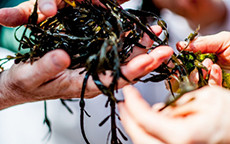A bill introduced in Congress this week calls for a federal study on the possibilities of coastal seaweed farming, and creating a new seaweed farming fund to “reduce cost barriers for indigenous communities, emboldening them to participate in coastal seaweed farming,” according to sponsors Reps. Jared Huffman, D-Calif., and Mary Peltola, D-Alaska.
The Coastal Seaweed Farm Act would direct the National Oceanic and Atmospheric Administration and U.S. Department of Agriculture to produce a joint study “evaluating the benefits and impacts of coastal seaweed farming and devise necessary metrics and regulations,” according to a statement Wednesday from Huffman and Peltola.
“Coastal seaweed farming has tremendous potential to serve as a sustainable replacement in food products, fertilizer, and animal feed; and it comes with a myriad of benefits for coastal communities – supporting local economies, providing food security, and regenerating marine ecosystems,” said Huffman.
“We also want to ensure equity in this field so that indigenous people can continue benefiting from the industry – so our bill creates a grant program to reduce cost barriers for native communities, many of whom have farmed seaweed for thousands of years.”
The Coastal Seaweed Farm Act directs NOAA and the USDA to:
· Study and publish a report on the benefits and impacts of coastal seaweed farming on the marine ecosystem.
· Develop regulations and establish evaluation metrics based on the study to ensure coastal seaweed farming, siting, and operations maximize potential benefits and avoid adverse impacts on the ecosystem, wildlife, fisheries, and local communities.
· Collaborate with the Interagency Working Group on Indigenous Traditional Ecological Knowledge, states, tribes, local governments and other federal agencies on best practices.
· Develop food safety regulations on farmed seaweed in coordination with the Food & Drug Administration.
· Provide educational materials for the training of incoming coastal seaweed farmers, prioritizing indigenous communities after the study is complete.
· Support coastal seaweed farming, including for purchasing equipment, obtaining, planting, and operating a coastal seaweed farm as well as processing, transporting, and storing seaweed.
· Use coastal seaweed farming for restorative ecological functions.
· Require USDA and NOAA to provide outreach to eligible entities and solicit comments and recommendations on each stage of operation of the grant program.







